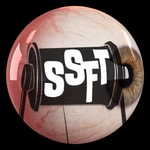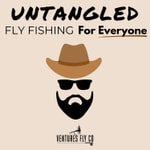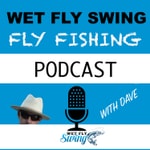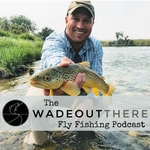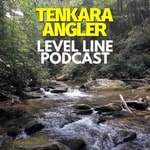Troutbitten – Details, episodes & analysis
Podcast details
Technical and general information from the podcast's RSS feed.
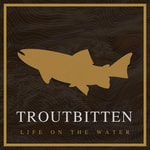
Troutbitten
Domenick Swentosky
Frequency: 1 episode/9d. Total Eps: 165

Life on the water. Troutbitten is a deep dive into fly fishing for wild trout in wild places. Author and guide, Domenick Swentosky, shares stories, tips, tactics and conversations with friends about fly fishing through the woods and water. Explore more. Fish hard. And discover fly fishing at Troutbitten.com — an extensive resource with 1500+ articles about trout, friends, family and the river.
Recent rankings
Latest chart positions across Apple Podcasts and Spotify rankings.
Apple Podcasts
🇨🇦 Canada - wilderness
02/08/2025#70🇬🇧 Great Britain - wilderness
02/08/2025#97🇩🇪 Germany - wilderness
02/08/2025#96🇺🇸 USA - wilderness
02/08/2025#35🇨🇦 Canada - wilderness
01/08/2025#52🇬🇧 Great Britain - wilderness
01/08/2025#99🇩🇪 Germany - wilderness
01/08/2025#67🇺🇸 USA - wilderness
01/08/2025#24🇨🇦 Canada - wilderness
31/07/2025#31🇬🇧 Great Britain - wilderness
31/07/2025#88
Spotify
No recent rankings available
Shared links between episodes and podcasts
Links found in episode descriptions and other podcasts that share them.
See all- https://wadeoutthere.com/
206 shares
- https://skwalafishing.com/
182 shares
- https://troutbitten.com/
173 shares
- https://www.instagram.com/troutbitten
163 shares
RSS feed quality and score
Technical evaluation of the podcast's RSS feed quality and structure.
See allScore global : 58%
Publication history
Monthly episode publishing history over the past years.
Casting and Mending -- Dry Fly Skills Series #4
Season 12 · Episode 4
lundi 26 août 2024 • Duration 52:54
Our discussion here is about casting dry flies, and that’s where all good fly casting starts. With a dry fly, there’s no weight at the end of the line to help us out. No split shot, no tungsten bead, conehead or bobber. Refining the dry fly stroke truly teaches us what the fly rod is built to do.
Ten and two. Acceleration and crisp stops between two points. Pause and allow turnover to happen. Feel the rod load and watch it all happen with the fly line in the air. Once you have that timing, your baseline is set, and you can take that same stroke to any rod angle, punching the fly around and laying things out just how you want them with a few adjustments.
Good mending is setup by good casting. Put the two together, and you can feed slack to a dry fly for perfect drag free drifts.
Having command over all of that . . . is a lot of fun.
My friend, Matt Grobe, joins me to for a great discussion on casting and mending dry flies.
Resources
READ: Troutbitten | Category | Dry Fly Fishing
READ: Troutbitten | Ten and Two
READ: Troutbitten | Put More Juice in the Cast
READ: Troutbitten | Five Tips for Better Mending
Visit
Troutbitten Website
Troutbitten Instagram
Troutbitten YouTube
Troutbitten Facebook
Thank You to Pre-Roll Ad Sponsors:
Skwala
and
Orvis
Thanks to TroutRoutes:
Use the code TROUTBITTEN for 20% off your membership at
https://maps.troutroutes.com
Thanks to Skwala
Use the code, TROUTBITTEN10 for 10% off your order at
https://skwalafishing.com/
Catching Up, With Leader Sales, Videos and Troutbitten Plans
Season 12
dimanche 18 août 2024 • Duration 34:51
For our Season 12 Intermission, my wife, Becky, joins me for a lighthearted look at what's going on in the Troutbitten world. We talk about the upcoming leader sale in the Troutbitten Shop (August 21). We talk about the New Trail Troutbitten beer, the event and the video. And we talk about the Fish and Film series on YouTube.
Becky and I also answer a bunch of fun questions from listeners.
Resources
VIDEO: Troutbitten | Fish and Film - One Morning For Versatility
VIDEO: Troutbitten | Beer and Friends -- Good Times and Good Stories with New Trail and Troutbitten
SHOP: Troutbitten | Category | Leaders
Visit
Troutbitten Website
Troutbitten Instagram
Troutbitten YouTube
Troutbitten Facebook
Thank You to Pre-Roll Ad Sponsors:
Skwala
and
Orvis
Thanks to TroutRoutes:
Use the code TROUTBITTEN for 20% off your membership at
https://maps.troutroutes.com
Thanks to Skwala
Use the code, TROUTBITTEN10 for 10% off your order at
https://skwalafishing.com/
How Woodsmanship Catches Fish
Season 11 · Episode 6
samedi 18 mai 2024 • Duration 01:17:38
There's an intangible quality built into the best anglers. It's about being comfortable and natural around the water. It's about having an instinct and a guiding intuition on a river that informs decision without even giving it much thought. It's an innate knowledge of the environment and what will happen next. Knowledge of the woods, water, weather and the trout comes together with ease and adds up to something that is hard to identify.
In this episode, we call it woodsmanship, outdoorsmanship, riversmithing and being river smart. Some might just call it being fishy.
Regardless of the word to identify this quality, it's something every angler wants. This episode is about what it is and how to attain it.
Resources
READ: Troutbitten | Fish Hard
READ: Troutbitten | It's All About Time on the Water
READ: Troutbitten | Life on the Water
Visit
Troutbitten Website
Troutbitten Instagram
Troutbitten YouTube
Troutbitten Facebook
Thanks to TroutRoutes:
Use the code TROUTBITTEN for 20% off your membership at
https://maps.troutroutes.com
Thanks to Skwala
Use the code, TROUTBITTEN10 for 10% off your order at
https://skwalafishing.com/
Feed Drop -- Troutbitten on the Wet Fly Swing Podcast
lundi 21 mars 2022 • Duration 01:21:01
Hello, friends.
Season two of the Troutbitten podcast is finished, and season three begins soon. So in this off week, I have something a little special for you.
Recently, I was a guest on the Wet Fly Swing podcast with Dave Stewart. So this is a feed drop of that episode in full. Dave runs a great show, and he’s been at it for a long time. I was happy to be a guest for the second time with Dave. And in this episode, we dig into a lot of streamer tactics, some nymphing techniques, and we have a good talk about what happens during the transition from winter into spring fishing.
I hope you enjoy it. And if you do, go check out more at wetflyswing.com. With over 300 episodes in the bank, Dave talks with some of the most knowledgeable and entertaining fly fishers in the game. I’ve learned a lot from Dave’s podcast over the years.
I hope you enjoy listening to my talk with Dave Stewart.
So until next week . . . fish hard, friends.
** NOTE ** Season Three begins next week. We return to the Season One format of full-panel discussions covering all things fly fishing for trout. And we're looking forward to it.
Bonus Round Q&A with Full Panel -- Tight Line and Euro Nymphing Skills, #10
Season 2 · Episode 10
dimanche 13 mars 2022 • Duration 54:03
Season Two concludes with a round table discussion for answering the most common questions about tight line and euro nymphing skills. My full panel of friends, Austin, Bill, Trevor and Josh join me to get deep in the weeds of the tactics, to clear up misconceptions, and offer their own ideas.
As Episode nine published, I realized there were many questions left to be answered. Daily, I received messages about a variety of techniques discussed in these nine essential skills. And the same themes cropped up. Anglers struggled with the same concepts. And those misunderstandings made their way to my inbox. It made sense to do one more podcast and answer these most popular, important questions.
So here's your bonus round . . .
We Cover the Following
- Tuck casting in cover and using sidearm angles
- Tuck casting doesn't need to be vertical
- Reading sighter for contact vs reading sighter for the strike zone
- More tips on finding the strike zone
- Forcing contact and using the extremes
- Tippet length variability
- Developing accuracy with more speed
- Refining the cast
- Leader diameter vs leader power
- Tips for fishing around structure
Remember, each of these podcasts is supported by a companion article of the same topic. And you can find the full overview of the Nine Essential Skills for Tight line and Euro Nymphing here:
READ: Troubitten | Bonus Round Q&A with Full Panel -- Tight Line Skills Series, #10
RESOURCES
READ: Troutbitten | The Nine Essential Skills for Tight Line and Euro Nymphing
READ: Troutbitten | Category | The Mono Rig
READ: Troutbitten | Full the Mono Rig System -- All the Variations, with Leader Formulas and Adjustments
READ: Troutbitten | Fly Fishing Strategies -- Tuck Cast
READ: Troutbitten | Put More Juice in the Cast
READ: Troutbitten | The Top Down Approach
READ: Troutbitten | Over or Under -- Your Best Bet on Weight
** NOTE ** Season Three begins in a coupe weeks. We return to the Season One format of full-panel discussion covering all things fly fishing for trout. And we're looking forward to it.
Visit:
Troutbitten Website
Troutbitten Instagram
Troutbitten YouTube
Troutbitten Facebook
Thanks to TroutRoutes:
Use the code TROUTBITTEN for 20% off your membership at
https://maps.troutroutes.com
Thanks to Skwala
Use the code, TROUTBITTEN10 for 10% off your order at
https://skwalafishing.com/
Putting It All Together -- Tight Line and Euro Nymphing Skills, #9
Season 2 · Episode 9
dimanche 6 mars 2022 • Duration 29:37
Here we are at the finish line. In this ninth installment of this Troutbitten Skills Series, my friend, Austin Dando, and I walk through some of the best tips for putting it all together. Because this set of skills, performed in order and flowing from one to the next, results in a great drift that starts and finishes in a convincing, trout-catching presentation.
Here are those nine skills:
- Angle and Approach
- Turnover and Tuck Cast
- Sticking the Landing
- Recovering Slack
- Finding Contact
- Locating the Strike Zone
- Guiding the Flies
- The Strike
- Putting it all Together
Each of them now has its own podcast and its own article that lays out the tactics in detail.
Tight line tactics are infinitely refinable. There is no end to how much better you can make the next drift. And if you get it perfect, then the next seam challenges you all over again. Contact and true control over the flies is a responsibility, and I’ve seen it overwhelm people at times. So, putting a number on the most basic skills and putting them in order makes things manageable. That is the purpose of this system -- this series -- of nine essential skills.
We Cover the Following
- Practice by imagining
- Don't be intimidated
- Trusting the transitions
- Finding the failures
- Focusing on just one
- Seeing success
- How fast the middle steps happen
- Watching the entrance and the exit of the flies
- Judging success
Resources
READ: Troutbitten | The Nine Essential Skills for Tight Line and Euro Nymphing
READ: Troutbitten | Category | The Mono Rig
READ: Troutbitten | Get a Good Drift, Then Move On
READ: Troutbitten | What To Trust
READ: Troutbitten | Trout Like to Do What Their Friends Are Doing
READ: Troutbitten |Asking the Best Questions to Catch More Trout
Visit:
Troutbitten Website
Troutbitten Instagram
Troutbitten YouTube
Troutbitten Facebook
Thanks to TroutRoutes:
Use the code TROUTBITTEN for 20% off your membership at
https://maps.troutroutes.com
Thanks to Skwala
Use the code, TROUTBITTEN10 for 10% off your order at
https://skwalafishing.com/
The Strike -- Tight Line and Euro Nymphing Skills, #8
Season 2 · Episode 8
lundi 28 février 2022 • Duration 34:36
The strike is the best part of fishing. It’s what we’re all out there waiting for, or rather, what we’re trying to make happen all day long. And the trout eats because we get so many things right. When the fish strikes, we strike back. Short, swift and effective, the hook finds flesh. Then we try to keep the trout buttoned up, and get it to the net.
In this podcast episode, there are two types of strikes that my friend, Austin Dando, and I focus on.
First, there’s the strike from a trout — the take, the hit, the “gimme that I wanna eat it,” from a fish. So we need to recognize and sense that strike.
Second, there's our strike — the hook set, the swift rod tip motion that drives the hook point home and attaches us to the trout. So it helps to have a plan and give some thought to how that’s done too.
Remember, fooling trout is the hard part. The rest of this — hooking and landing a fish, comes much easier.
We Cover the Following
- Are hook sets really free?
- Set on anything?
- Set on anything unusual or unexpected
- Difference of over or under weighting
- Is there a sixth sense?
- Direction of the hook set
- How far? How fast?
- Fly rod types and hook sets
- The Check Set
- Can you ever set too fast?
- Slack and hook sets
Remember, each of these podcasts is supported by a companion article of the same topic. And you can find the full overview of the Nine Essential Skills for Tight line and Euro Nymphing here:
READ: Troutbitten | The Nine Essential Skills for Tight Line and Euro Nymphing
READ: Troutbitten | #8 The Strike -- Nine Essential Skill for Tight Line and Euro Nymphing
READ: Troutbitten | Category | The Mono Rig
READ: Troutbitten | Fly Fishing Strategies -- Plan for the Hookset
READ: Troutbitten | Don't Guess -- Set the Hook and Set Hard
READ: Troutbitten | Hook Set at the End of Every Drift
READ: Troutbitten Tight Line Nymphing Skills -- The Check Set
Visit:
Troutbitten Website
Troutbitten Instagram
Troutbitten YouTube
Troutbitten Facebook
Thanks to TroutRoutes:
Use the code TROUTBITTEN for 20% off your membership at
https://maps.troutroutes.com
Thanks to Skwala
Use the code, TROUTBITTEN10 for 10% off your order at
https://skwalafishing.com/
Guiding the Flies -- Tight Line and Euro Nymphing Skills, #7
Season 2 · Episode 7
dimanche 20 février 2022 • Duration 33:48
Part Seven of this Troutbitten Skills Series focuses on guiding the flies. Once the nymphs are cast and settled into the target seam, it's time to take them to the trout. Guiding the flies is a blend of two skills that I call leading and tracking. At the core, this skill of guiding the flies is fishing the flies. And this is what anglers tend to focus on most — for good reason. It’s the longest in duration. It’s the most active, and has the most room for variation.
In truth, there are number of ways to dead drift nymphs through one seam. And the choices we make are about how much influence we want to have on the flies. A leading approach puts the angler in charge, and a tracking approach let's the river dictate the course of the flies. Guiding the flies is an effort to mix the two.
We Cover the Following
- The advantages of leading
- Control, contact and the dead drift
- Over weighting
- The advantages of tracking
- Less control with fewer options, but a truer drift?
- Under weighting
- Is pure tracking possible?
- Guiding as a mix of the two
- Slipping contact
- Find the perfect weight
- Why use both?
- Why guiding works.
Remember, each of these podcasts is supported by a companion article of the same topic. And you can find the full overview of the Nine Essential Skills for Tight line and Euro Nymphing here:
READ: Troutbitten | The Nine Essential Skills for Tight Line and Euro Nymphing
READ: Troutbitten | #7 Guiding the Flies -- Nine Essential Skill for Tight Line and Euro Nymphing
READ: Troutbitten | Category | The Mono Rig
READ: Troutbitten | Leading vs Tracking vs Guiding the Flies
READ: Troutbitten | Tracking the Flies
READ: Troutbitten | How to Lead the Flies
Visit:
Troutbitten Website
Troutbitten Instagram
Troutbitten YouTube
Troutbitten Facebook
Thanks to TroutRoutes:
Use the code TROUTBITTEN for 20% off your membership at
https://maps.troutroutes.com
Thanks to Skwala
Use the code, TROUTBITTEN10 for 10% off your order at
https://skwalafishing.com/
Locating the Strike Zone -- Tight Line and Euro Nymphing Skills, #6
Season 2 · Episode 6
dimanche 13 février 2022 • Duration 38:34
Part six of this Troutbitten Skills Series is about locating the strike zone. This zone of water -- this cushion near the bottom of the river -- is the default target and the baseline location for our flies.
Most of what happens in a river occurs in the strike zone. It's where the trout spend most of their time. It's where the bugs and baitfish live. Understanding everything about the strike zone allows us to know exactly how and where we want to present the nymph.
My friend, Austin Dando, joins me to help break down and understand this crucial concept.
Unlocking this knowledge — understanding the strike zone -- then finding it and drifting your flies there, is perhaps the most pivotal moment in your nymphing skills progression. It changes everything.
We Cover the Following
- What is the strike zone?
- Why is the strike zone important?
- Why gliding the strike zone outperforms touching the bottom
- Touching bottom to find the strike zone
- Watching the sighter speed to find the strike zone
- Gliding through the strike zone
- Deviating our drifts in and out of the strike zone
- The downshift
- Depth and speed of the strike zone
- More on reading the sighter
Remember, each of these podcasts is supported by a companion article of the same topic. And you can find the full overview of the Nine Essential Skills for Tight line and Euro Nymphing here:
READ: Troutbitten | The Nine Essential Skills for Tight Line and Euro Nymphing
READ: Troutbitten | #6 Locating the Strike Zone -- Nine Essential Skill for Tight Line and Euro Nymphing
Visit:
Troutbitten Website
Troutbitten Instagram
Troutbitten YouTube
Troutbitten Facebook
Thanks to TroutRoutes:
Use the code TROUTBITTEN for 20% off your membership at
https://maps.troutroutes.com
Thanks to Skwala
Use the code, TROUTBITTEN10 for 10% off your order at
https://skwalafishing.com/
Finding Contact -- Tight Line and Euro Nymphing Skills, #5
Season 2 · Episode 5
dimanche 6 février 2022 • Duration 35:38
Part five of this Troutbitten Skills Series is about finding contact. Because after the tuck cast, after we stick the landing and begin to recover slack, we need to find contact on sighter.
Contact is visual. It's about reading the sighter to know that we are in touch with the flies from rod tip to the nymph or split shot. It's not about touching or ticking the riverbed. Instead, the contact we're looking for is seen on the sighter.
With contact, we know everything about the depth and speed of our flies. We know where they are, and we determine where they are going. That's the advantage of a tight line (contact) nymphing system.
Importantly, this does not mean we are directly in touch at all times with the fly, because we often get better drifts without such direct influence over the nymphs. But without contact at points through the drift (and sometimes the whole way) we are simply guessing about the location of the flies. To take advantage of the ultimate control that tight line and euro nymphing rigs offer, we must learn to read contact on the sighter -- to know we are in touch and know where the flies are.
Reading the sighter and finding contact is critical.
My friend, Austin Dando, joins me on episode five for an in-depth discussion of this technique.
We Cover the Following
- Contact is seen, not felt
- Reading the sighter
- Sighter material and construction
- The Backing Barrel
- The bow in the sighter
- Nervous sighter
- Seeing beyond the sighter
- Contact let's us trust the sighter
- Forcing contact
Remember, each of these podcasts is supported by a companion article of the same topic. And you can find the full overview of the Nine Essential Skills for Tight line and Euro Nymphing here:
Resources
READ: Troutbitten | The Nine Essential Skills for Tight Line and Euro Nymphing
READ; Troutbitten | #5 Finding Contact -- Nine Essential Skill for Tight Line and Euro Nymphing
READ: Troutbitten | Category | The Mono Rig
READ: Troutbitten | Contact is Visual
READ: Troutbitten | The Backing Barrel might be the best sighter ever
READ: Troutbitten | Design and Function of the Standard Troutbitten Mono Rig
Visit:
Troutbitten Website
Troutbitten Instagram
Troutbitten YouTube
Troutbitten Facebook
Thanks to TroutRoutes:
Use the code TROUTBITTEN for 20% off your membership at
https://maps.troutroutes.com
Thanks to Skwala
Use the code, TROUTBITTEN10 for 10% off your order at
https://skwalafishing.com/
